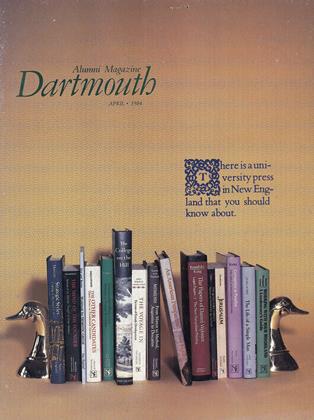Some weeks ago, a Dartmouth faculty member wrote me a letter urging me to take the Alumni Magazine as a challenge to emphasize scholarship, social concerns, and the like over athletics, business success, and similar matters. The implication that the Magazine isn't interested in the worthy goals he enumerated irritated me at first, because, as I hope a regular reading of the Magazine demonstrates, we are. As the main avenue of communication between the College and its alumni, we seek to report the news of the College; to print articles that we find lively, informative, and relevant to our readership; and to recognize excellence wherever we find it in the Dartmouth community. To cite just a couple of examples, last fall, staffer Shelby Grantham outlined in a very probing cover story some of the difficulties the brilliant Ernest Everett Just '07 faced as a black biologist in a hostile racial environment in America, and to a lesser extent, abroad; in March, Prof. Frank Smallwood '51 recounted some of the outstanding achievements of several undergraduate interns in various areas of public policy studies in the nation's capital; and in this issue, O. Ross McIntyre '53 ruminates on what it means to be a creative thinker in and out of the laboratory.
Over the last six months we have run pictures of track star Jim Sapienza '85 on more than one occasion, not just because those shots are interesting in themselves or because they glorify the long athletic tradition of the College, but to call attention to a young man who, in the eyes of many observers, is one of the finest athletes to wear the Green in many a decade. As with E. E. Just, the Washington Interns, and Dr. McIntyre's perceptions, Jim Sapienza personifies an aspect of the Dartmouth experience worth knowing about. All of them call to mind the exhortation of one of my most memorable Dartmouth professors, the late Herb West '22, whose Excelsior! I take to be the unspoken motto of this magazine.
For the Dartmouth graduate who achieves distinction on Wall Street or Main Street or in the NFL is, in our view, as deserving of recognition and a "Well done!" as the scholar whose research illuminates the world of France during the Middle Ages. Indeed, the fact that one can graduate from this college, enter fields as various as microbiology,. professional baseball, or the theater, and continue to excel, is one of the hallmarks of Dartmouth. This is not to suggest that there is no difference in terms of the ultimate social benefit between the work of an efficient sanitary engineer and the cell physiologist who develops a protocol for treating a particular cancer. Society needs them both. But the fact is there are many Dartmouth graduates with ΦBK keys who have gone on to distinguish themselves in worlds other than academe. And just for the record, one need not be a card-carrying Democrat to have a social conscience anymore than one needs a Ph.D. to continue to be interested in ideas.
My correspondent, whom I have invited to write for us on occasion, closed with the comment that he regularly read the Harvard Magazine which he found to be "miles ahead" of the journal you now hold in your hands. I would be the last to disagree on that count; Harvard's editor, John Bethell (my seminar leader in a publishing course last summer), is a real pro in every sense. With all due respect to my correspondent's well intended urgings, we have Herbie West's battle cry in the very back of our minds.
 View Full Issue
View Full Issue
More From This Issue
-
 Cover Story
Cover StoryConsortium
April 1984 By Shelby Grantham -
 Feature
FeatureHanover Sabbatical
April 1984 By Robert Conn '61 -
 Feature
FeatureCenters of Excellence and the Survival of Creativity
April 1984 By O. Ross Mclntyre '53 -
 Feature
FeatureRobert Frost Keeps Me Company Often Uninvited
April 1984 By Kenneth Andler '26 -
 Article
ArticleIt's Just Like Talking to People
April 1984 By Debbie Schupack '84 -
 Class Notes
Class Notes1959
April 1984 By William G. Long
Douglas Greenwood
-
 Lettter from the Editor
Lettter from the EditorVisions and Revisions
SEPTEMBER 1983 By Douglas Greenwood -
 Lettter from the Editor
Lettter from the EditorRuffly Speaking
NOVEMBER 1984 By Douglas Greenwood -
 Feature
Feature"I have Nineteen Thousand. Do I hear Twenty?"
MARCH • 1985 By Douglas Greenwood -
 Lettter from the Editor
Lettter from the EditorSome Thoughts on Commencement, 1985
June • 1985 By Douglas Greenwood -
 Article
ArticleVox Clamantis
DECEMBER • 1985 By Douglas Greenwood -
 Article
ArticleThe winter of our discontent
APRIL 1986 By Douglas Greenwood
Lettter from the Editor
-
 Lettter from the Editor
Lettter from the EditorEditorial Comment
December, 1928 -
 Lettter from the Editor
Lettter from the EditorEditorial Comment
APRIL 1930 -
 Lettter from the Editor
Lettter from the EditorPress
October 1947 -
 Lettter from the Editor
Lettter from the EditorIn Keeping With This Month's Cover Story, The Review Barks Up Dartmouth's Tree.
MAY 1992 -
 Lettter from the Editor
Lettter from the EditorThe Fall of '63
November 1983 By Douglas Greenwood -
 Lettter from the Editor
Lettter from the EditorLetter From Paris
December 1948 By WILLIAM I. ZEITUNG '43

